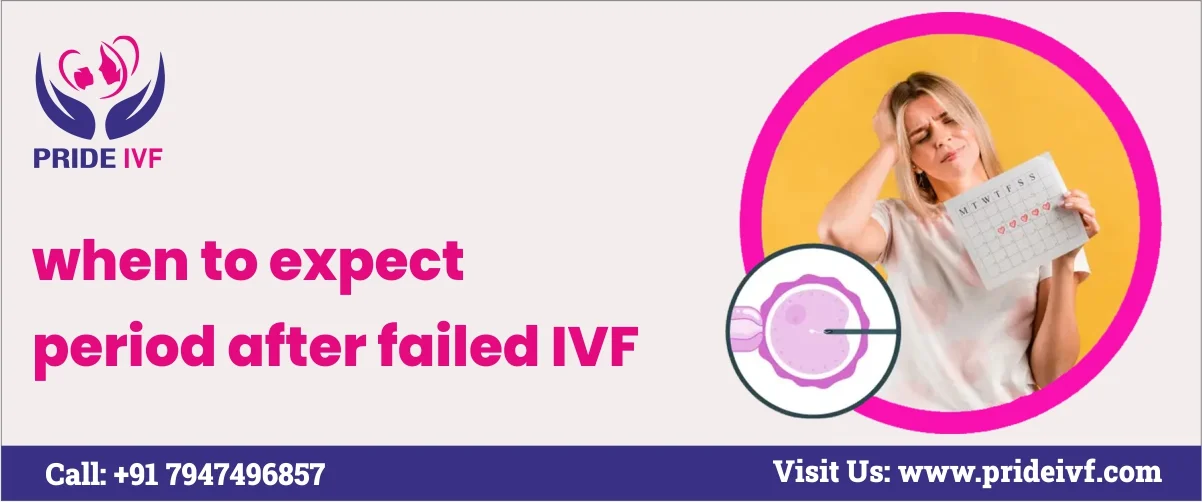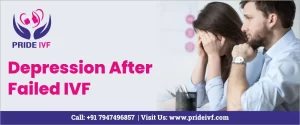The onset or lack of menstruation following the psychological and physical ordeal of an IVF cycle might be a critical predictor of success. Understanding the menstrual cycle after treatment is important for many women receiving IVF at the International Pride IVF Centre in Delhi. Following an unsuccessful IVF cycle, many women have uncertainty about their menstrual health, ability to conceive in the future, and when to expect period after failed IVF. With hope and clarity, this in-depth guide from the International Pride IVF Centre in Delhi explores what women can anticipate from their menstrual cycle after an unsuccessful IVF effort.




The Process
The implantation process for an embryo only takes 40 hours. In this instance, a lady may experience scarce spotting and stomach pain as with menstruation within three days. It is too early to run the human chorionic gonadotropin (HCG or hCG) blood test, therefore there’s no need to worry about it. Observe yourself for 5 – 6 days (though it’s better on the 14–15th day), you can identify the desired hormone if such a spot becomes increasingly rare and ultimately stops.
After The Embryo Transfer, Are there any Symptoms or Indications That Will Make an IVF Test Negative?
The only reliable diagnostic method for determining if assisted reproduction is successful or not is pregnancy testing. One can measure the β-hCG hormone by a blood test or urine test.
When taking this test, the existence of specific symptoms that resemble those that develop at the start of pregnancy is not predictive of the outcome. Many symptoms, including nausea, drowsiness, and abdominal pain, are associated with the side effects of the drugs used for therapy and can appear even when there is no pregnancy. Although early gestation is usually asymptomatic, this does not guarantee a successful pregnancy.
Also Read: positive signs after embryo transfer and negative signs after embryo transfer
Ovarian Hyperstimulation Syndrome (OHSS)
Another potential cause of a missing period after a failed IVF round is ovarian hyperstimulation syndrome. This disorder develops when the ovaries overstimulate and release several eggs leading to larger ovaries and occasionally a fluid buildup in the abdominal cavity. In addition, Ovarian Hyperstimulation Syndrome (OHSS) can cause hormone imbalances and postpone the onset of menstruation.
Most of the time, OHSS is moderate and goes away with time with rest and adequate fluids. On rare occasions, though, it may worsen and necessitate medical care. After an IVF cycle, you should speak with your fertility doctor right away for an assessment and treatment plan if you have symptoms like bloating, breathing issues, or abdominal pain. Go Through: Questions to Ask IVF Doctor After a Failed Cycle.
Comprehending the Menstrual Cycle After IVF
-
Menstrual Cycle Timing
Menstruation may begin anywhere between the third and fourteenth day following the embryo transfer if infertility is not successful, particularly if progesterone support medication is stopped. Individual hormonal backgrounds and the particulars of the IVF procedure can affect the precise date.
-
Post-IVF Menstrual Characteristics and First Symptoms
A failed IVF therapy (Why IVF Fails?) can result in an especially intense first period because of the hormonal changes and drugs utilised during the process. Following an unsuccessful IVF cycle, the first menstruation may be very painful or heavy. It’s common for women to have heavier and more painful periods than usual, yet this is still worrying. Clots and thicker endometrial pieces are possible; while they are usually regarded as typical, they can occasionally be concerning. In the initial months after a botched surgery, there is also often variability in the length and flow of the cycle.
Lets get started
-
Hormonal Correction and Reset
The intense hormonal therapies used in IVF have the potential to interfere with the menstrual cycle. The body needs time to return to its hormonal baseline following a failed cycle, which may postpone the commencement of menstruation. The kinds of hormones used and the person’s hormonal state before beginning IVF are two factors that affect this reset. Also Read: What Happens To Your Body After Failed IVF?
-
The Effect of Psychology and Stress Reduction
An unsuccessful IVF attempt might have significant psychological effects. Stress and disappointment can worsen hormonal imbalances after failed ivf, which may result in additional irregularities or delays in the menstrual cycle. Also, thinking about when to expect period after failed IVF is another major reason for delayed periods. To get through this difficult period, women must seek help, whether it be through talking therapies, support groups, or counselling.
Long-Term Reproductive and Menstrual Health
-
Cycles That Recur and Fertility Tracking
Menstrual cycles should start to normalise in the months that follow an unsuccessful IVF treatment. Following these cycles can reveal important information about a woman’s current reproductive health and preparedness for either a natural pregnancy or future fertility treatments.
-
When to Think About Taking Additional Action
More testing may be helpful if monthly irregularities continue or if planned subsequent fertility attempts are made. Depending on the individual’s health and reproductive objectives, tests like hormone profiling, pelvic ultrasounds, and perhaps reevaluating the IVF protocol with modifications can be taken into consideration.
When to See a Physician?
It’s imperative to speak with a healthcare professional in the following situations: –
- Despite a negative pregnancy test, the period hasn’t begun within two weeks of the anticipated date. The women must go to a physician and ask when to expect period after failed IVF as it is important to know.
- There is profuse bleeding or any other indication that this person is not acting normally. A doctor can do tests and evaluations to determine the underlying cause of it.
A Look Back at IVF Fertility Issues
While a failed IVF can be disheartening, but some women may discover that their chances of becoming naturally pregnant in the months that follow are increased after an unsuccessful IVF treatment. IVF procedures stimulate the ovaries, which may result in a brief increase in fertility. A couple should discuss their options and the ideal timing to become pregnant with their fertility doctor if they wish to pursue conception further. Also Read: 3 Failed IVF Cycles? What Next?.
Some Advice for Getting Over the Setback and Continuing on
Although it can be difficult to deal with the disappointment of an unsuccessful IVF round, there are steps that couples can take to support themselves in moving forward. Among some advice are:
- Ask your friends and relatives for assistance.
- Attend therapy sessions or join a support group designed specifically for infertile couples.
- Eating healthfully, exercising, and getting enough sleep are all important aspects of taking care.
- Consider stopping your reproductive treatments for a bit so that you may focus on other aspects of your life.
- Consider alternate methods of establishing a family, such as adoption or surrogacy.
Final Thoughts
Our dedication at International Pride IVF Center goes beyond the IVF process itself. We are aware of how difficult IVF procedures can be. For both your physical and emotional recovery after IVF (stages of grief after failed ivf), it is essential to track and manage your menstrual health and to know when to expect period after failed IVF. We work hard to provide continuing medical care and support so that every woman’s path to parenthood is accompanied by compassion, cutting-edge medical care, and understanding. Our team is committed to supporting you at every stage, whether you are thinking about pursuing additional fertility treatments or require assistance following an unsuccessful IVF cycle.
Reliable medical counsel, patience, and resilience are necessary to navigate the complexity of in vitro fertilisation and its outcomes. To properly manage their reproductive health, we advise women and couples to maintain hope and to take an active role in their interactions with healthcare professionals. At the International Pride IVF Centre, we strive to accompany you at every stage of your reproductive journey by understanding; the physical and emotional components of IVF.




